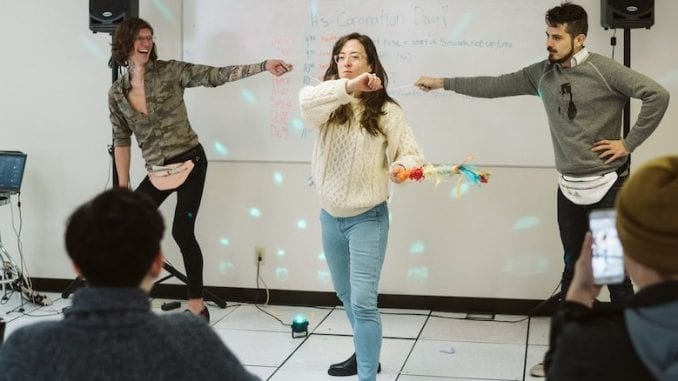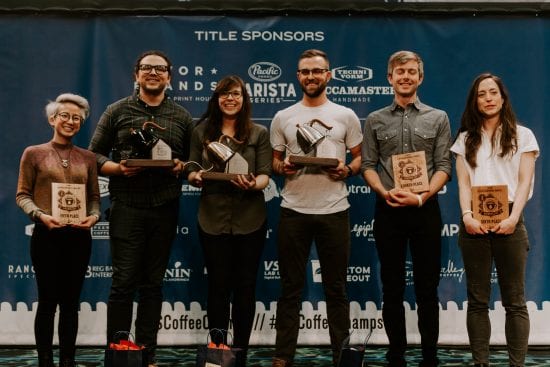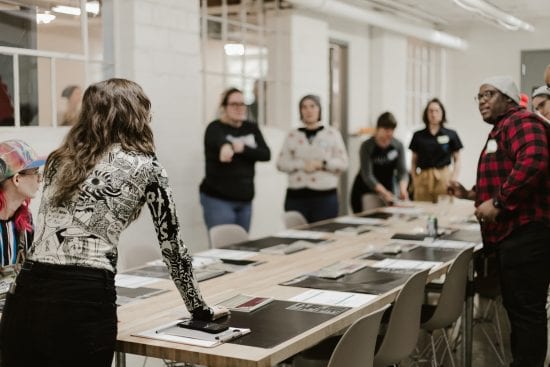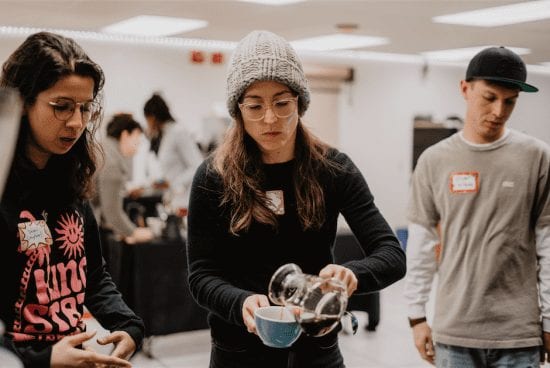
We continue our conversation with Atlas Coffee Roasters’ Chelsey Walker-Watson, discussing lessons learned from competition, working with the Glitter Cat Bootcamps, and more.
BY CHRIS RYAN
BARISTA MAGAZINE ONLINE
Cover photo (of Chelsey preparing to destroy a unicorn piñata at the Glitter Cat Brewers Cup Bootcamp) by @heytayphoto
In part one of our interview with Chelsey Walker-Watson, we discussed getting interested in coffee, and how an initial café job spurred a coffee career that eventually led to multiple finals appearances in the U.S. Brewers Cup. Coffee competition not only resulted in personal and professional growth for Chelsey, it also led to her sharing those experiences as a mentor to other coffee competitors through the Glitter Cat Bootcamps.
In part two of this interview, we talk to Chelsey about growing from competition, working with the Glitter Cats, and more.
Are there any lessons you’ve learned about life/yourself from competing for a while?
To me, personal and professional growth are the biggest reasons to compete! I now realize that I love public speaking when I am sharing something meaningful to me, especially a perspective that could be valuable for other coffee lovers to consider. I realized that I know a lot about how to make coffee taste great and am not limited to hospitality as a skill. Although I viewed myself as shy and risk-averse, through competition, I know that I can be creative and vulnerable.

Speaking of public speaking, I know you took part in the recent Glitter Cat Bootcamps with sessions about gender equity and coffee careers. Can you describe what you talked about there and how those presentations went?
(Glitter Cat founder) T. Ben Fischer and I met while waiting in line to come on stage for the nationals results last season, and I complimented Glitter Cat and expressed a desire to support their efforts. Atlas later became an official sponsor for the 2020 bootcamp season. T. Ben asked if Atlas could support the bootcamps with a presentation related to career sustainability and mental health, and I suggested sharing the Gender Action Learning Systems (GALS) efforts of some of our producer-partners in Uganda, DRC, and Rwanda.
GALS is a community-led empowerment methodology that uses value principals of inclusion, respect, and equity to improve rural farmer livelihoods; Glitter Cats’ objectives include to “increase the diversity, representation, and success of competitors who self-identify as part of a marginalized community” and to “provide professional tools for career development beyond the competition stage.” Clearly, the values of both groups of coffee professionals are aligned, connecting the beginning of the coffee supply chain to the end.

I presented this workshop for Glitter Cats at the Barista, Brewers, and Roasters Bootcamps, while my colleague Tymika presented to CIGS competitors. We spent half of our time sharing the GALS work of coffee producers, exploring the vision journey of Bukonzo Joint Cooperative Union in Uganda as an example, and the second half of our time was focused on a goal-setting activity inspired by GALS to explore our personal needs and dreams.
Because literacy levels can vary in rural communities, GALS tools use illustration as the basis for communication to ensure accessibility to all members. Community members create individual explorations of their lives and their aspirations, and then move on to the household and cooperative level. The Glitter Cats applied those principles to draw a specific personal goal, including their current state, what they wanted to accomplish, the actions and milestones to do so, and the challenges and resources along their journey. Tymika and I led the group by sharing our own personal goals. The experience was powerful, and it involved great vulnerability and self-reflection for all, as well as opportunities to explore our shared experiences.
Finally, I also included a personal speech in each workshop to explore some of the inherent challenges (and responsibilities) of retail coffee professionals, such as the realities of emotional labor and working at the end of a long supply chain, the struggles surrounding our identity and authenticity of self when serving the public, and our duty to be our own advocate since we are the only people that will ever know our needs.

Last question, back to competition: Will you compete in Brewers Cup this year? If not, are you comfortable sharing why?
No, I am not competing in Brewers Cup this year. In approaching my last competition season, I knew that it would most likely be my last, and I decided not to compete for several reasons.
Competition, regardless of your work ethic, takes immense time and resources, and I have other goals to prioritize outside of coffee.
These days, most U.S. competitors and finalists (and certainly winners) are using luxury coffees for Open Service, primarily Geshas because they are often outstanding. I competed with a natural process Yemeni coffee (also high-end, but an underrepresented origin) for two years and a washed Kenya, and I think that I performed as well as possible using coffees that represent an authentic and direct relationship for me and coffee stories that need to be told.
I always want to bring something new to the competition stage. To that end, I am focused on supporting the Glitter Cat Brewers this competition season. Many of them are first-time competitors with an interesting perspective to share, a lot of which has not been voiced on a competition stage, so watch them perform if you have the opportunity!

